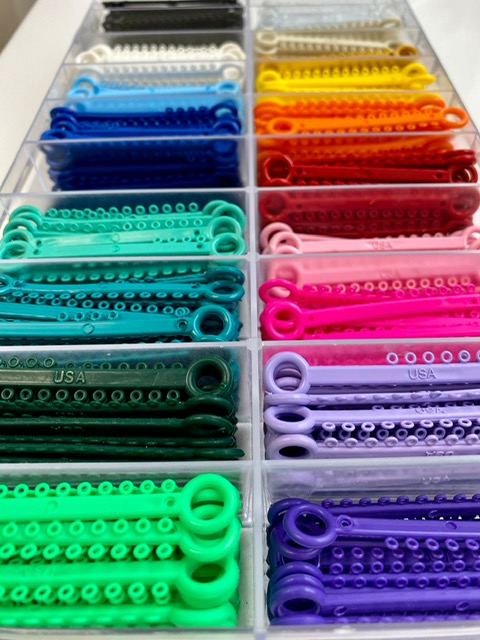You may be thinking about getting braces or in the process of undergoing treatment and have heard your orthodontist mention elastics to you. If you are wondering what they are and what their role is in your orthodontic treatment it can be helpful to understand just how they can impact your jaw and teeth alignment and help in reducing overbite, underbite, open bite, and crossbite.
What are Elastics for Braces Used for?
The elastics used in braces treatment are little rings that sit around specific hooks and brackets on your braces. They can be used with all types of fixed braces such as metal, ceramic, and lingual and generally run between the top and bottom jaw to either close a gap between teeth, pull the upper teeth back, and move the lower teeth forward or vice versa.
With braces that are fixed to the front of your teeth, the elastics will run between your teeth and your cheeks, but with lingual braces, the elastic will sit on the inside of your mouth. There are 3 degrees of strength of the elastic band, light, medium, and heavy. Which one you will need is decided by your orthodontist on the day of fitting.
How do I Know if I Will Need Elastics?
If you have fixed braces such as metal, ceramic, or lingual braces then there is a possibility that you may need elastics at some point in your treatment, however, this will be discussed with you beforehand. Not everyone with braces will need elastics, this will be decided at the point of your assessment and is then usually introduced later as a way of slowly increasing the force on your teeth.
Your orthodontist will be the person to fit your elastics and change them at adjustment appointments if they have lost their stretch. You will be given replacement elastics for you to replace yourself when you feel they are too loose and need changing. Your orthodontist will show you how to fit new elastics and where they are attached to your braces and explain the importance of replacing the elastics at the same time, so the forces exerted from them are equal.
It may be a surprise to learn that elastics aren’t just for people with fixed braces but can be used for those undergoing Invisalign treatment and rather than the elastics attaching to hooks on a fixed brace, they attach to small buttons on the aligners.
Do I Need to Wear My Elastics All the Time?
Some people will only need to wear their elastics for a short amount of time if their teeth don’t need to move far or their teeth move quickly. Others with slower-moving teeth or who have more severe misalignments will need to wear their elastics for longer. Elastics should only be removed for toothbrushing, other than that elastics should be worn almost all the time, day, and night. We advise you to keep a packet of spare elastics with you as much as possible in case you need new ones after eating or if one breaks, and, as mentioned previously, it’s advisable to change them regularly as they lose their effectiveness over time as they stretch.
Are Elastics Proven Safe to be Used in Orthodontic Treatment?
It is understandable to be worried about choking or an allergy to latex to come into play when we think about elastics being used in orthodontics, but the elastics used for braces are very unlikely to break and are widely used across the board. It is unlikely that the elastics will break and if it does happen, they are so small and thin you can barely feel them ping in the first place. However, it is possible to have an allergy to latex, if you have this allergy then tell your orthodontist before fitting as there are synthetic bands available.
It’s normal to feel some discomfort when the elastics are first fitted as they are moving your teeth and jaw into brand-new positions. Taking over-the-counter painkillers like ibuprofen or paracetamol can help manage any soreness and discomfort.
Your Expert Orthodontist in Chorley is Here to Answer Any of your Questions.
At Chorley Orthodontics, we specialise in providing high-quality orthodontic care to our patients in a range of treatments including metal, ceramic and lingual braces, and Invisalign and functional braces. We are a specialist orthodontist in Chorley who can provide you with the expertise and knowledge on how braces work, how they will impact you, and the best course of action for you to take to gain the smile of your dreams.
Elastics are just a small part of the journey in achieving the smile you want, so if you have any further questions on getting braces and what that involves then contact your expert orthodontist in Chorley today to book your free consultation.




